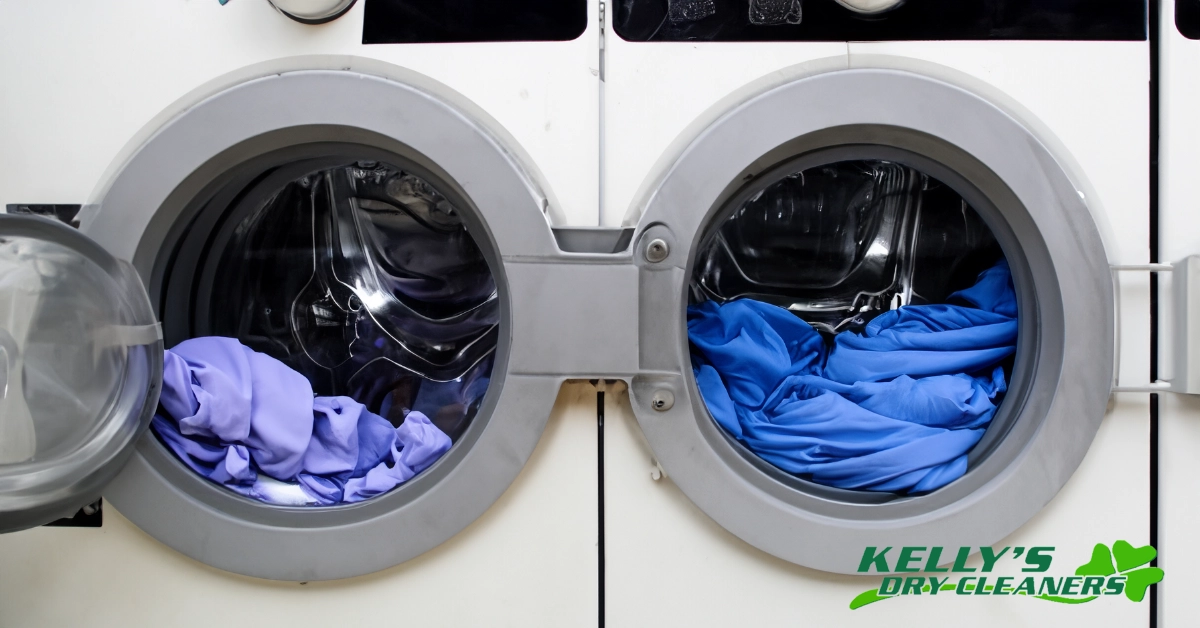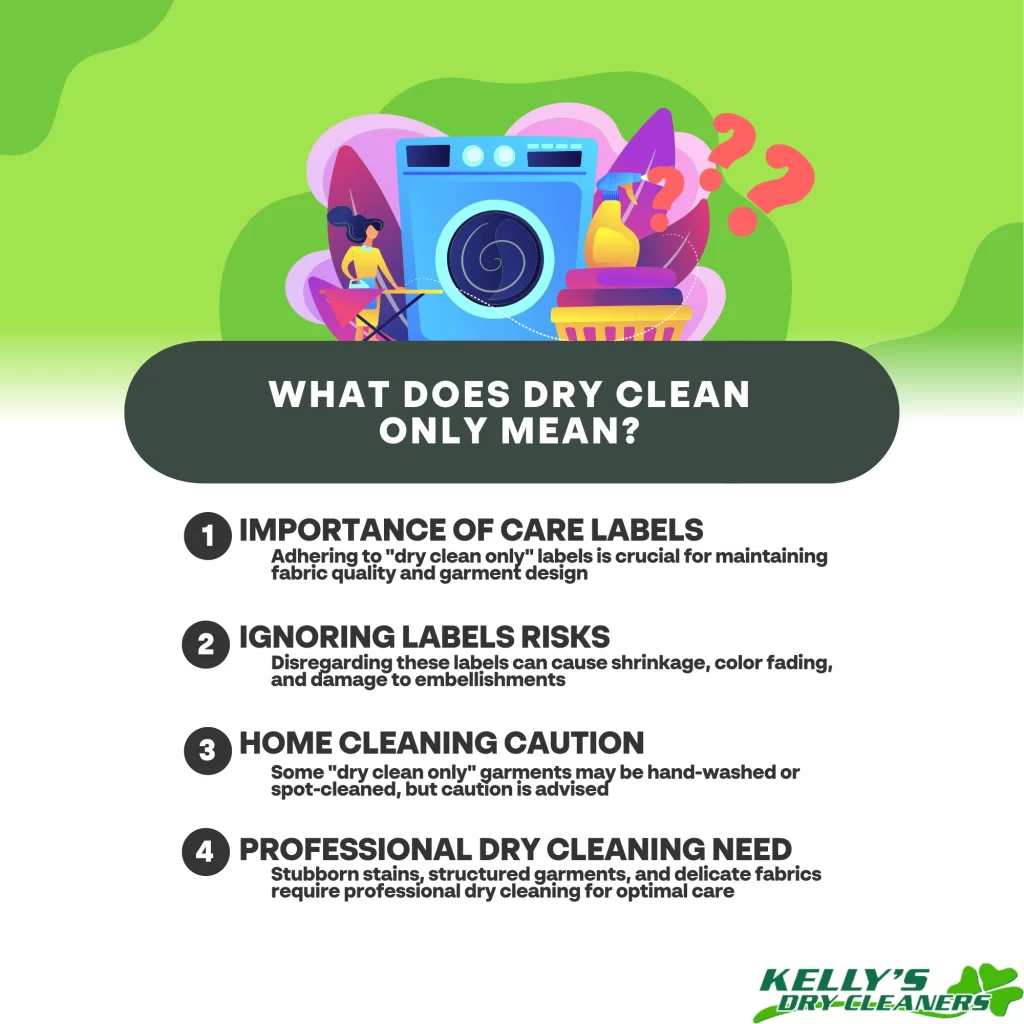Dry clean only clothes are a common sight in many wardrobes. From delicate fabrics to intricate designs, these garments require special care and attention. But what exactly does “dry clean only” mean? Let’s dive into the world of dry cleaning to understand why some clothes bear this label and what it entails.
Today’s world has a wide range of clothing options catering to our unique fashion preferences. However, with so many choices comes the need to pay close attention to the complex garment care labels that come with them.
You may have come across some clothes labeled as “dry clean only, ” meaning they cannot be washed with water like regular laundry. Instead, these pieces require a unique cleaning process known as dry cleaning, which involves using a solvent-based solution to remove dirt and stains effectively.
Professionals typically do this process with the equipment and expertise to handle delicate fabrics and intricate designs. So, if you own any garments labeled as “dry clean only,” it is best to take them to a reputable dry cleaner for proper maintenance and care.
Make sure to follow the label’s care instructions to avoid damaging the garment and ensure it lasts longer. Clothes labeled “hand wash only” should be washed gently in cold water and laid flat to dry. Those labeled “do not bleach” should not be treated with any type of bleach, including color-safe bleach. When you see a label on clothes that says “tumble dry low,” it means you should dry them on a low heat setting. To avoid any harm or reduction in size of your clothes, it’s best to follow this advice. Following these care instructions can keep our clothes looking and feeling great for years.
Why do some clothes say “dry clean only”?
When you see the words “dry clean only” on a clothing tag, it indicates that the fabric or garment is unsuitable for traditional washing methods. This could be due to several factors:
- Fabric type: Certain fabrics, such as silk, velvet, and cashmere, are prone to shrinking, distorting, or losing color when they come into contact with water. To avoid these potential damages, clothes from these materials are best for dry cleaning.
- Delicate construction: Some garments have intricate bead work, sequins, or delicate stitching that can be easily damaged or altered in shape during the washing process. Dry cleaning allows these clothes to be cleaned without the risk of these decorations coming loose or the fabric getting stretched.
- Special finishes: Clothes with exceptional finishes, like formal wear with pressed pleats or suits with creases, can lose their crispness and shape if washed. Dry cleaning helps maintain these finishes, ensuring the garment looks its best when worn.
What happens if you ignore the “dry clean only” label?
Ignoring the “dry clean only” label can lead to unfortunate consequences. The specific outcome depends on the garment and the extent of the care instructions’ disregard. Here are a few potential risks you might encounter if you decide to take matters into your own hands and wash a “dry clean only” item:
- Shrinking and distortion: If the fabric is prone to shrinking or distortion when exposed to water, it may lose its original shape, becoming unwearable or fitting incorrectly.
- Color loss and bleeding: Some fabrics are not colorfast, meaning they can bleed or fade when washed. If you attempt to clean these garments at home, you risk the colors running and staining other parts of the garment or your other clothes in the wash.
- Damage to delicate embellishments: Washing delicate garments with intricate embellishments, such as beads or sequins, can cause these decorations to become loose or fall off entirely, ruining the original design.
- Wrinkles and texture changes: Certain fabrics are more prone to wrinkling or changes in texture when exposed to water. If you attempt to wash an item that is labeled as “dry clean only” and made from certain materials, it may cause permanent creases or a change in texture, resulting in a significantly altered appearance of the garment.
Can you wash dry, clean clothes only at home?
Although the temptation to save time and money by washing your dry, clean clothes at home is strong, it’s generally best to refrain from yielding to it. The “dry clean only” label serves an essential purpose – protecting your garment and extending its life. However, consider several alternative methods if you’re feeling adventurous and wish to handle the cleaning yourself.
- Hand washing: Some dry, clean-only clothes can be hand washed carefully. Before diving into the sink, check the care label for specific instructions. If it gives the green light for hand washing or mentions a preferred method, follow the guidance to the letter. When hand washing, use a gentle detergent and cold water to minimize the risk of damage.
- Spot cleaning: If the garment has a small stain, try cleaning it instead of thoroughly washing it. Grab a clean cloth, dampen it with a mild detergent solution, and gently dab the stained area. Remember, spot cleaning is a bit like playing garment roulette, so proceed with caution.
- Using home dry cleaning kits: Another option for the brave and DIY-inclined is a home dry cleaning kit. These kits typically contain a cleaning solvent and a unique bag. You place the garment in the bag, along with a cleaning cloth or sheet, and then follow the instructions on the kit. The bag is placed in the dryer, and the heat activates the solvent, creating a mini dry cleaning environment.
When should you take clothes to the dry cleaner?
Even if you’re a seasoned laundry pro, there are still times when it’s best to wave the white flag and take your clothes to the dry cleaner. Here are a few instances where professional dry cleaning is the way to go:
- Presence of stubborn stains: If you’ve got a stain that’s giving you a hard time or is of the “handle with care” variety (like oil or ink), it’s best to leave it to the experts. Dry cleaners have the know-how and specialized solvents to tackle these tricky stains without causing further damage.
- Garments with structural elements: Clothes, such as boning in corsets or interlinings in tailored jackets, are best left to the professionals. The unique construction of these garments can make them difficult to clean without the risk of damage or alterations.
- Extremely delicate fabrics: If you’re dealing with a highly soft fabric, like antique lace or a vintage silk piece, it’s best to choose the dry cleaning option. These fabrics can be finicky and prone to damage, so the gentle touch of a dry cleaner is your best bet.
- When in doubt: When the care label plays it coy and doesn’t give clear instructions, it’s always safer to choose dry cleaning. Taking the garment to a professional cleaner ensures it gets the proper care without risk.
The Bottom Line
Dry clean only is a label that should be taken seriously. It means the garment requires a different cleaning approach to protect its fabric, shape, and color. If you don’t pay attention to this label, you may end up ruining your clothes permanently and having to throw them away.
While some dry clean only clothes can be hand washed or cleaned using home kits, it’s best to leave the task to the professionals to minimize the risks. Remember, when in doubt, it’s always a safe bet to choose the dry cleaner.
Get your Dry Cleaning Done Right at Kelly’s Dry Cleaners!
Looking for dry cleaners in Farmington? Kelly’s Dry Cleaners your ideal choice. Renowned for our exceptional dry cleaning services, we cater to all your sensitive and “dry clean only” garments. Entrust your clothes to our team, skilled in handling a broad spectrum of fabrics and styles, to ensure they receive the best care possible. When you drop off your clothes at Kelly’s Dry Cleaners, be assured that they will be returned to you in the best possible condition.




